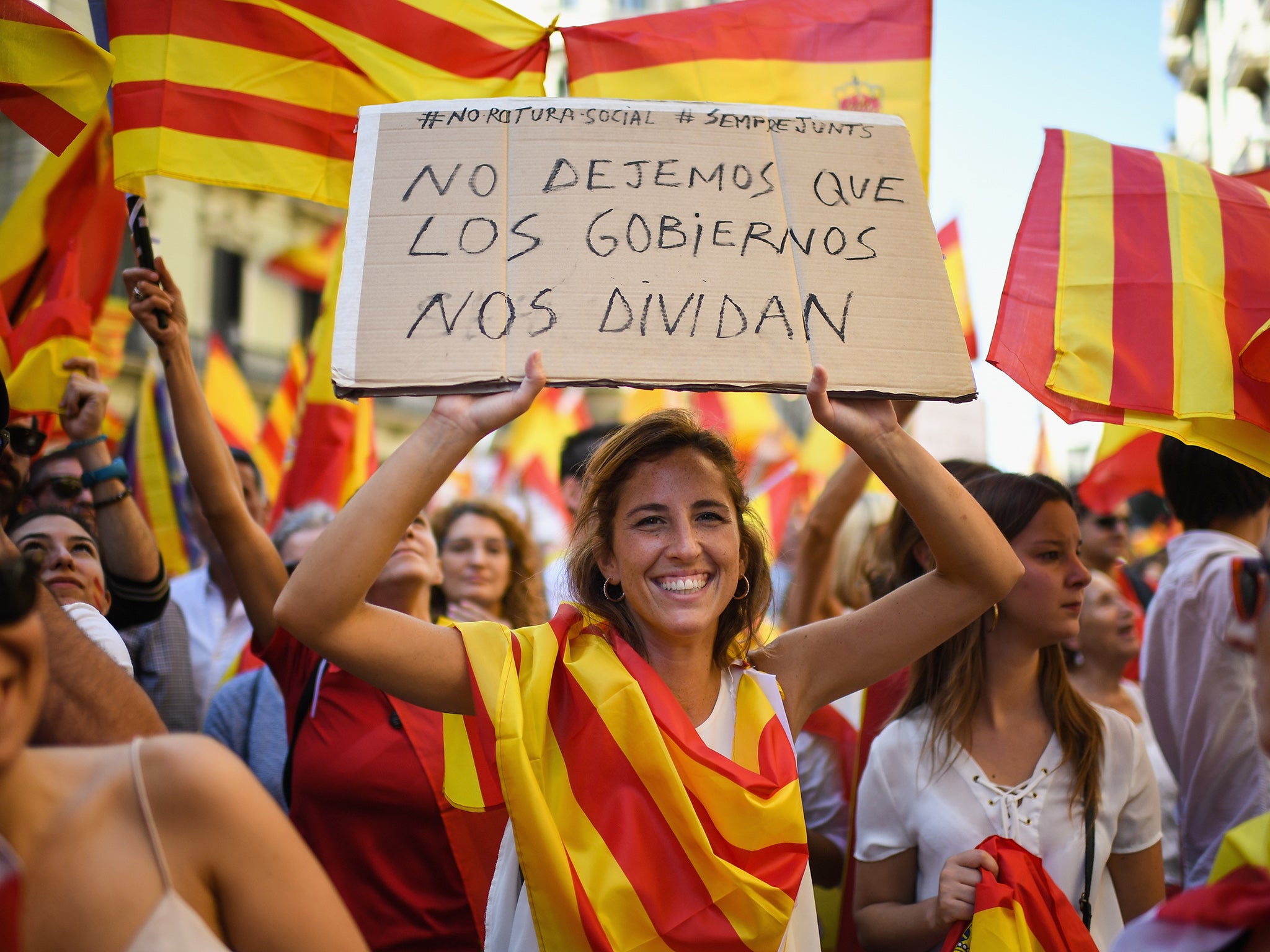Catalan referendum: Thousands march for Spanish unity ahead of expected declaration of independence
Demonstrators demand that non-nationalist Catalans ‘should not be marginalised’ at peaceful protest

Your support helps us to tell the story
From reproductive rights to climate change to Big Tech, The Independent is on the ground when the story is developing. Whether it's investigating the financials of Elon Musk's pro-Trump PAC or producing our latest documentary, 'The A Word', which shines a light on the American women fighting for reproductive rights, we know how important it is to parse out the facts from the messaging.
At such a critical moment in US history, we need reporters on the ground. Your donation allows us to keep sending journalists to speak to both sides of the story.
The Independent is trusted by Americans across the entire political spectrum. And unlike many other quality news outlets, we choose not to lock Americans out of our reporting and analysis with paywalls. We believe quality journalism should be available to everyone, paid for by those who can afford it.
Your support makes all the difference.Hundreds of thousands of pro-Spanish unity supporters marched through the streets of Barcelona on Sunday, exactly a week after voters in a banned referendum in Catalonia voted overwhelming in favour of breaking away from Spain.
The massive pro-Spain march, which passed off without incident, ran under the slogan “For the restoration of seny” – the Catalan word for common sense or folk wisdom.
The organisers of the march, the pro-unity association, the Societat Civil Catalana (SCC), later claimed nearly a million pro-unity supporters had turned out. That figure was disputed by the local police force, who estimated the demonstrators at the still very significant total of 350,000.
While Spanish premier Mariano Rajoy did not attend but expressed his support in a tweet, a number of heavyweights from the ruling Partido Popular, including the president of the Madrid region, Cristina Cifuentes, took part. Also present was Albert Rivera, leader of Spain’s fourth largest party, Ciudadanos, and the Nobel-winning author Mario Vargas Llosa.
In a reflection of the divisions within the pro-unity camp, though, only a few top members of Spain’s leading opposition party, the Socialists, participated, the most prominent being Josep Borrell, a former president of the EU. As for Spain’s hard-left Podemos party, its leader Pablo Iglesias was roundly booed by some 50 pro-unity demonstrators when he was spotted at Barcelona Sants railway station early this morning – catching a train for Madrid.
In a manifesto read at the end of the demonstration, there were demands that non-nationalist Catalans “should not be marginalised” and Mr Vargas Llosa launched a stinging attack on the nationalists, accusing their leaders, among them regional premier Carles Puigdemont, of being golpistas – conspirators in a coup d’état. “The nationalist plot will not destroy 500 years of Spanish unity,” he insisted.
The march came just two days before Mr Puigdemont is expected to make a key address to the Catalan parliament, which opposition sources have reportedly claimed will see him make a unilateral declaration of independence.
“He should not do such a senseless, provocative thing,” Jose Domingo, vice-president of the SCC, said during the demonstration.
Mr Domingo’s comments echoed Spanish PM Mariano Rajoy’s words on Sunday, when he hinted strongly in an interview he was considering using Article 155 of the constitution, which allows for direct intervention from Madrid, should an independence bid happen.
Speaking to El País in his first full-length newspaper interview since last Sunday’s banned referendum sparked Spain’s worst political crisis in 40 years, Mr Rajoy said “[Catalan] independence is not going to happen.”
Asked specifically about article 155, Mr Rajoy answered: “I am not ruling out anything that the law says.”
“Ideally, we should not have to resort to drastic solutions, but in that case there would have to be rectifications.”
Mr Rajoy also promised that both the Civil Guard and the Spanish national police would remain in Catalonia “until things return to normal”.
Today’s massive pro-unity demonstration and Mr Rajoy’s uncompromising stance are not the only external pressures Mr Puigdemont faces in the countdown to a possible declaration of independence. This week senior Catalan business executives have met the regional premier to urge him to cancel the declaration.
Around a dozen companies, including Catalonia’s two largest banks, Sabadell and la Caixa, have already said they are moving their business headquarters to other parts of Spain. Amid the widespread concern that they may not be the last, the focus on Mr Puigdemont’s parliamentary speech on Tuesday could hardly be more intense.
Join our commenting forum
Join thought-provoking conversations, follow other Independent readers and see their replies
Comments